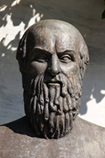Aeschylus

Aeschylus (b. c. 525 BC, Eleusis, near Athens – d. 456 BC, Gela, Sicily) was an ancient Greek playwright. Only seven of Aeschylus's works have been preserved in their entirety. Aeschylus is one of the most famous tragedians. He used the legend of the Argonauts in his work and even dedicated a special tetralogy to it; It probably included Lemnian Women, Hypsipyle, Cabarets and the satirical drama Argo. Due to the lack of information, it is difficult to say anything specifically about the tragedies that have not reached us. The plot of “bound Prometheus” unfolds entirely in Scythia, that is, in the Caucasus. This work is based on the myth of the rebellious Titan, who was chained to the Caucasus by the order of Zeus. Out of the Greek sources that reached us, this tragedy is one of the first to mention the Caucasus (lines 442, 719). The Colchis, the Chalybes, and other neighboring peoples are also mentioned. Aeschylus' characters (especially Prometheus) were widely reflected in world literature, painting, and music.
Literary works: ორესტეა, თბ., 1974; ტრაგედიები, თარგმ. გ. სარიშვილისა, თბ., 1978.
Literature: ურუშაძე ა., ძველი კოლხეთი არგონავტების თქმულებაში, თბ., 1964; ყაუხჩიშვილი ს., ბერძნული ლიტერატურის ისტორია, ტ. 1, თბ., 1950.
R. Gordeziani


